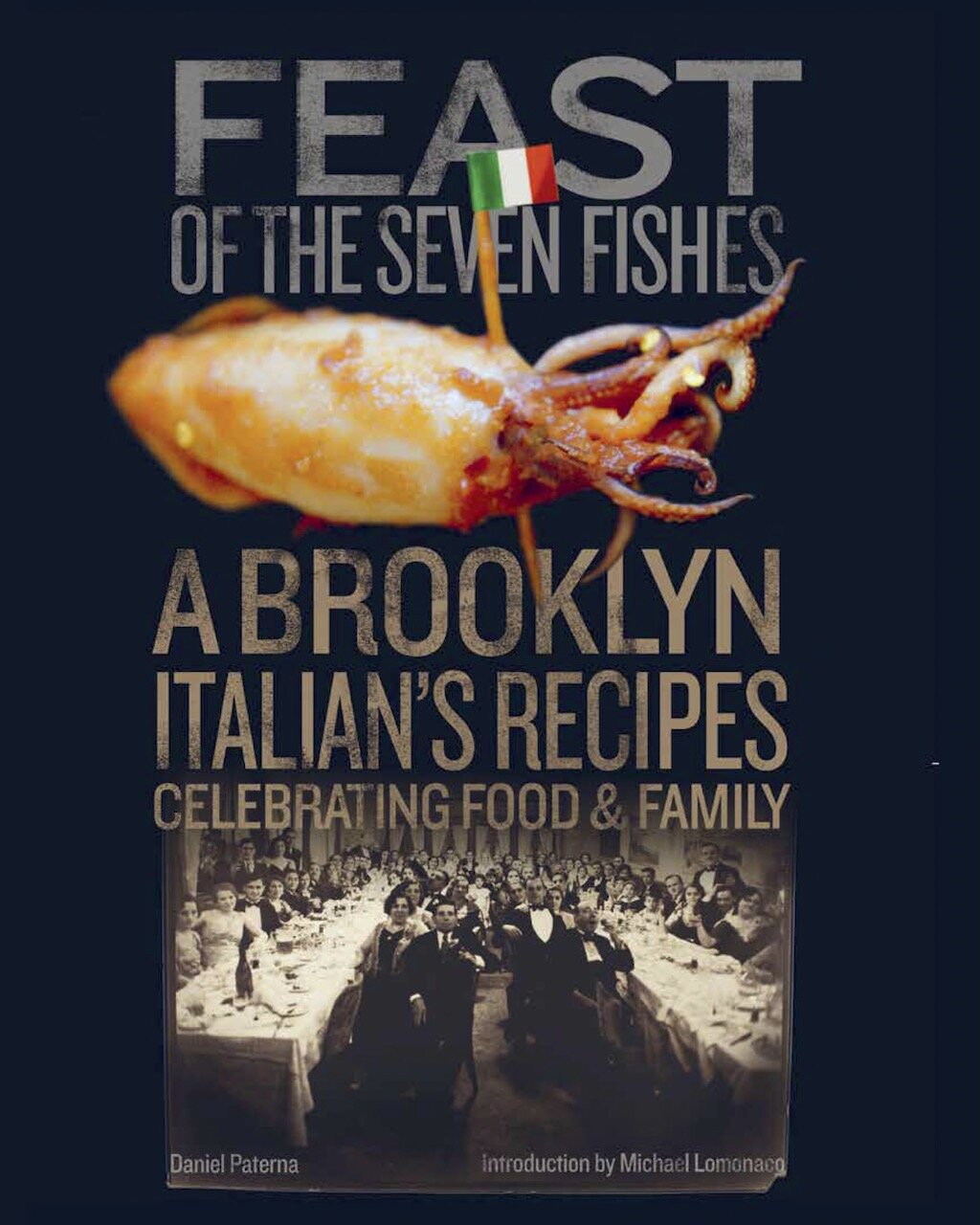Daniel Paterna's Interview - "Feast of the Seven Fishes"
by Cindi Sutter, Founder & Editor — It is the rare occasion that I’ve interviewed anyone whose storytelling revealed such passion and depth. Stay tuned next week, as Daniel provides favorite recipes from his grandmother’s recipe box for your Virtual Easter Supper Club. You’ll feel like you’re in Brooklyn dishing on stories, traditions and of course yummy Italian food!
“Feast of the Seven Fishes reads as though it came from your own family’s kitchen.” — Michael Lomonaco, former Epicurious TV host and chef at Porter House New York. A Brooklyn-Italian’s Recipes Celebrating Food and Family is Daniel Paterna’s passion title!
Daniel’s generousity, kindness and love for sharing food and spirit exude from this book. The interview below includes phrases like…J-Easter = Family = Friends & Food. How can we perpetually unify around that? What is the most impactful way for us to share traditions with future generations?
Daniel Paterna takes you on a magical journey into a hidden world. Through recipes handed down in his family, stunning photos taken by the author himself, and three generations of memories, Paterna reveals the soulful, humorous, and always delicious history of Italian-Americans in Brooklyn.
Paterna is the real deal: a second-generation Italian American whose family has preserved their culture from the shores of Naples to the streets of Bensonhurst. He’ll show you how to make long-forgotten recipes like stuffed calamari as he takes you through all the stores, restaurants and bakeries in Brooklyn where artisans are still doing things the old way. This is an intensely personal book that powerfully illustrates the essence of the American experience: the ways food, family, and memory are preserved and changed by the immigrants who brought them to our shores, and the children of those immigrants who keep the flame of tradition alive.


Last November I was fortunate to interview Daniel, so I now present you with some of my favorite memories from our conversation. The questions and answers below reveal how Daniel constantly retrofits Italian traditions all the while recording the memories. For Daniel, food is family for all who participate in these most cherished moments and times.
When and why did you decide to enter the field of graphic design?
“After banging around in conventional learning for a while, I realized I had more ability to communicate using pictures. I dropped out of my first year of college and at one point I took the postal worker test, which was overwhelming and inspirational at the same time. I forced my own hand to take the leap of faith to go into a creative field that relied on my own creativity. When you adopt the USA as a way of life, it’s hectic and no one knows exactly what to do.”
Did you ever imagine you’d be an author?
“Yes, It was in the sixth grade in 1970 that I became aware of my own failed relationship with traditional learning in a parochial school. The late 1960s were a turbulent time that spilled into the Brooklyn of the ’70s.
Maybe I couldn’t quite put the feeling into words at the time, but basically I thought, “one day I’d like to write a book about this place because no one would believe it.” My wife had a demanding job, so I embraced the rhythms of the house and that included meal times, what to do after they leave for school, are they returning? Suddenly I was a bachelor for the day, so I invited the neighbors! More than any other topic, food, family, and traditions had historically been written mostly by women. But there I was, learning more about cooking and shopping, so I began to write these tips and recipes down. I felt like I was at the delta of my river. So I invited orphans of the table.”
At what point in your life did you feel this type of book was important to you?
“When I had children of my own I was 42 years old, I felt I was at the beginning of my first family stepping stone, and the transition to the grandchildren’s generation was eminent. I began to write and document. Passing down and sharing traditions and shared family history is very important to me. Fewer were writing them down and they were becoming more precious to me; just like Julia Child’s recipe cards. In my Grandma’s time, I felt no one will remember, so it’s up to me to tell the story. A story that even includes— How to turn petrified fish into tender white flesh—which at the time seemed miraculous and took 2 weeks.
One of our big celebrations is on Christmas Eve. We visit Santa as it’s a shorter line on Christmas Eve. Italian traditions include gifts on Christmas Eve and the child in me felt that Christmas was less fun with all the extended family; but then we went to Midnight Mass, to hear Mom sing in the choir, and by the time we got home it was 2 am: So that’s when we finished eating whatever we couldn’t eat the first time around the table. Easter played a dual role in the Feast of the Seven Fishes as well.”
What was the driving force of this book? Why did you write it?
“I wanted to share the essence of the memories my Grandmother recounted, which included the making of Lasagna with her Dad and the connectivity that surrounds those experiences. I was wary of the film and media’s cliched portrayal of the Italian-American experience. I felt as though we were all pigeonholed into the impressions of guns, mafia, and crime that some people came away with. Yes, it was at your doorstep if you chose. It was a small but all-too-real part of growing up.
We knew the difference between reality and fantasy as it’s portrayed in the media. But I wanted to show the Brooklyn, and the Italian community, that I knew from my own experience and my own family.
My daughter is Vegan, so Lasagna on Christmas Day was a poignant college essay entry. All the while she wanted to embrace what had gone on for centuries, but her biggest challenge, was to enjoy the special meals, she shied from too much non-vegan food and sometimes experienced self-shaming for her overindulgence.“
What’s one of your favorite memories concerning your childhood and Italian ancestry?
“My grandmother was the curator of recipes and the preserver of traditions. Christmas Eve - eating after midnight church - celebrating the birth of Jesus and his crucifixion at Easter. 7 different dishes = 7 sacraments = 7 creation days. J-Easter = Family = Friends & Food; meant all were welcomed, including celebrating what I called a Jewish Easter.
While sitting at my Grandmother Luisa’s table eating her mozzarella basil frittata, she would often bring out her precious few belongings and pull out postcards of an Italy she loved so much.
She would then speak in a Neopolita dialect about her memories while I ate the food of her ancestral town—Vico Equense. On other occasions, she would stand outside in the breeze around our Brooklyn home on 61st street, close her eyes and stand with her arms wide and feel the breeze. It was not until I went to her hometown 50 years later and stood at the foot of her town, facing the Bay, that I realized she had been imagining a younger version of herself at the foot of the Bay of Naples, filling her spirit with the air from the sea from our small Brooklyn alleyway. Food was the bridge from Naples to her new home in America. It was something I’ll never forget. “
Why is this particular tradition, the Feast of the Seven Fishes that takes place on Christmas Eve and Easter so important to you and your family and the Italian community in Brooklyn?
“In our Southern Italian Brooklyn “block,” Feast of the Seven Fishes symbolized the Seven Days of The Creation or Seven Sacraments, it was also our way of celebrating those generations of little means who struggled to make Christmas Eve/Easter so special. My kids began asking long before the holiday…when do we get grandma’s lasagna?
In fact, it was for some, the Christmas gift. A way of pulling out the stops, to sum up the year in a fashion specific to the province from whence your ancestors came. It seemed to us that resources were spent on these meals more than on store-bought gifts.
It was also a way of fraternizing with people from other blocks or hoods that you would not ordinarily see outside of Italian shops, markets, and churches. A special time to share as a family and a community. Also, there was an elevated stature if you were chosen to write the Christmas Eve/Easter Menus; telling a great fun family story didn’t hurt either.
In the end, it’s really all about creating a visual history of my family’s cooking traditions and my connection to my Italian American heritage!”
Feast of the Seven Fishes: A Brooklyn-Italian’s Recipes Celebrating Food and Family (powerHouse Books from Penguin Random House, November 5, 2019).
DANIEL PATERNA has created some of television's most recognizable images; during his career, he has worked with leading content brands including ABC News, AMC, A&E, Disney, ESPN, History, and PBS, earning awards from such institutions as PRINT, Communication Arts, and Promax/International Broadcast Design Association. His design for NBC's coverage of the 1996 Olympics won him an Emmy from The National Academy of Television Arts & Sciences. Paterna was born and raised in the house his grandfather built in Brooklyn, graduated from The Pratt Institute with honors in graphic design, and currently heads his own Brooklyn-based design group. His photography has been on display at the Museum of Modern Art, New York, and the 440 Gallery in Brooklyn.
BOOK INFORMATION
Publisher: powerHouse Books, a division of Penguin Random House
Release date: November 5, 2019
ISBN: 978-1-57687-930-6
Price: $39.95 US / $53.95 CAN
Pages: 256
Publicity: Mindbuck Media Book Publicity, Mindbuck Media Book Publicity, emily@mindbuckmedia.com

